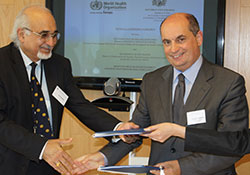Reducing health inequalities in small countries: WHO/Europe signs agreement with San Marino

WHO
San Marino is providing €1.25 million for a five-year project to support European countries with small populations address the social determinants of health and reduce health inequities. The project will establish a strategic platform for investment for health and development for small-population countries, which will bring together WHO, countries, academic institutions and regional development organizations with a shared interest in developing policy and governance responses that advance health equity as part of a fair and sustainable society.
Claudio Podeschi, Minister of Health and Social Security, National Insurance and Gender Equality, signed the project agreement with WHO/Europe on 1 August 2012.
The effects of social and economic shifts often emerge more quickly in small-population countries, and thus offer early warning signs and opportunities to identify and test policy solutions to mitigate these effects on health. Member States of the WHO European Region with a population of under 2 million include Andorra, Cyprus, Estonia, Iceland, Luxembourg, Malta, Monaco, Montenegro and San Marino.
“The nature of social determinants, and developments in society and technology all call for a radical change in how we govern for health as part of fair and sustainable societies. This new project, launched today with the generous support of San Marino, will help address health equity in small-population countries, as well as identify and test appropriate innovations that can be used throughout the WHO European Region,” said Zsuzsanna Jakab, WHO Regional Director for Europe.
Project objectives
Specifically, the project and new platform will:
- consolidate policy innovations, applying emerging evidence and tools to the key policy challenges of small countries and identifying promising solutions that can be applied at the European level and beyond;
- cross-fertilize learning and enrich national policies through active collaboration among small countries;
- bring this learning to wider audiences through the documentation of progress, and the organization of thematic policy dialogues and capacity-building events on the implementation of fair and sustainable approaches to health and development; and
- foster alliances for fair and sustainable health and development through learning exchanges and partnerships at local, national and European levels.
“I am delighted to sign this agreement with WHO/Europe, through which San Marino can act as a catalyst for identifying and testing new scientific evidence and policy solutions to reduce health inequities in small-population countries,” commented Claudio Podeschi.
The project will be coordinated by WHO/Europe’s European Office for Investment for Health and Development in Venice, Italy.



